CHC50113 - EYLF Practices, Holistic Development & Planning Cycle
VerifiedAdded on 2023/06/17
|13
|2328
|405
Homework Assignment
AI Summary
This assignment delves into the Early Years Learning Framework (EYLF) practices and the holistic approach to child development, emphasizing the importance of considering a child's physical, emotional, social, and spiritual wellbeing. It identifies contextual factors like age, gender, culture, and personal interests that influence a child's development and stresses the significance of understanding these factors to foster wellbeing and create career opportunities. The assignment also summarizes the ACECQA planning cycle, which includes analyzing learning, documentation, planning, implementation, and reflection, and describes the role of summative assessment in evaluating student learning. Furthermore, it discusses how educators can collaborate with colleagues and families to support children's learning, highlighting the importance of family involvement and peer collaboration among educators to develop effective teaching techniques. Desklib provides a platform for students to access this assignment and other resources.
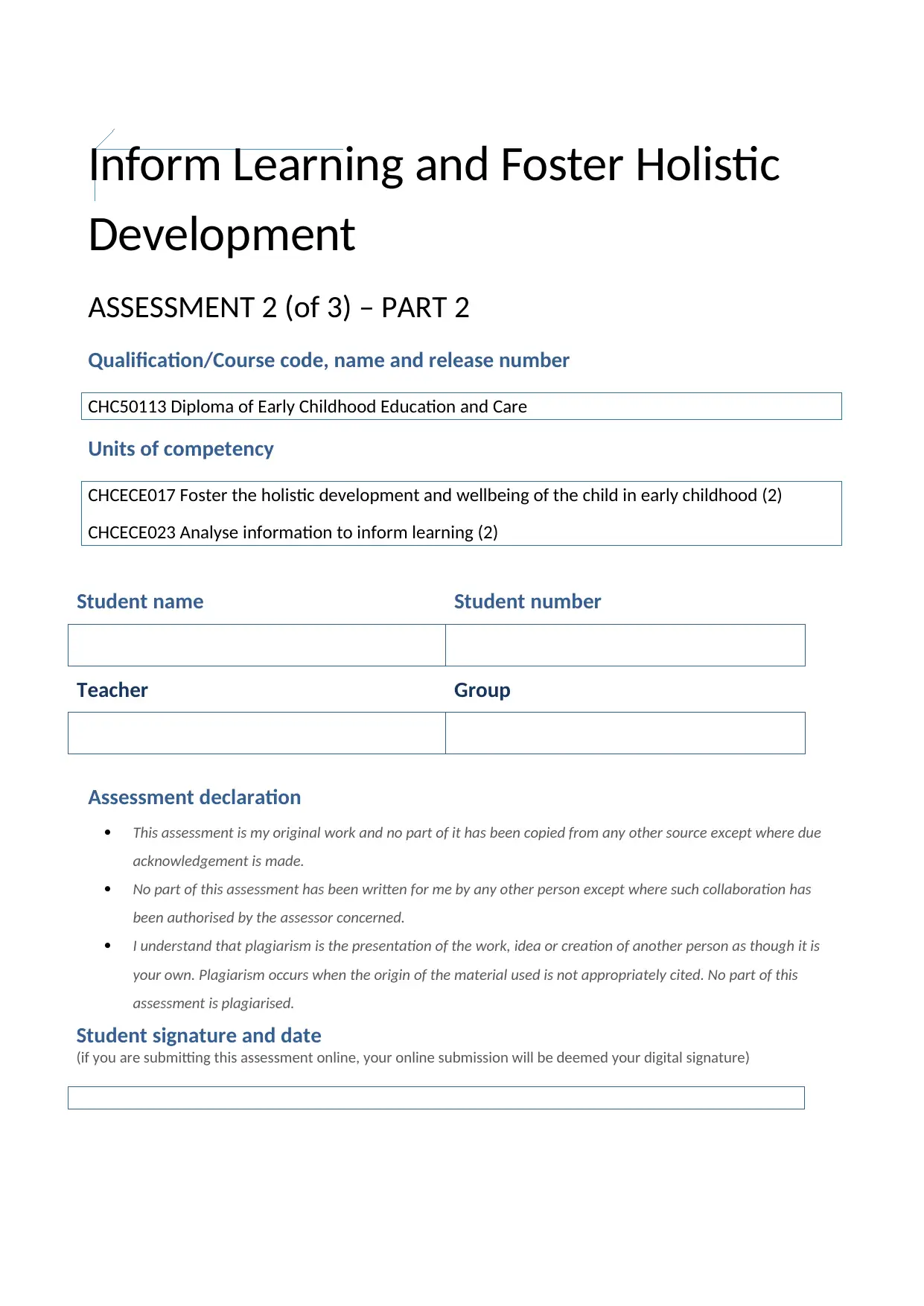
Inform Learning and Foster Holistic
Development
ASSESSMENT 2 (of 3) – PART 2
Qualification/Course code, name and release number
CHC50113 Diploma of Early Childhood Education and Care
Units of competency
CHCECE017 Foster the holistic development and wellbeing of the child in early childhood (2)
CHCECE023 Analyse information to inform learning (2)
Student name Student number
Teacher Group
Assessment declaration
This assessment is my original work and no part of it has been copied from any other source except where due
acknowledgement is made.
No part of this assessment has been written for me by any other person except where such collaboration has
been authorised by the assessor concerned.
I understand that plagiarism is the presentation of the work, idea or creation of another person as though it is
your own. Plagiarism occurs when the origin of the material used is not appropriately cited. No part of this
assessment is plagiarised.
Student signature and date
(if you are submitting this assessment online, your online submission will be deemed your digital signature)
Development
ASSESSMENT 2 (of 3) – PART 2
Qualification/Course code, name and release number
CHC50113 Diploma of Early Childhood Education and Care
Units of competency
CHCECE017 Foster the holistic development and wellbeing of the child in early childhood (2)
CHCECE023 Analyse information to inform learning (2)
Student name Student number
Teacher Group
Assessment declaration
This assessment is my original work and no part of it has been copied from any other source except where due
acknowledgement is made.
No part of this assessment has been written for me by any other person except where such collaboration has
been authorised by the assessor concerned.
I understand that plagiarism is the presentation of the work, idea or creation of another person as though it is
your own. Plagiarism occurs when the origin of the material used is not appropriately cited. No part of this
assessment is plagiarised.
Student signature and date
(if you are submitting this assessment online, your online submission will be deemed your digital signature)
Paraphrase This Document
Need a fresh take? Get an instant paraphrase of this document with our AI Paraphraser
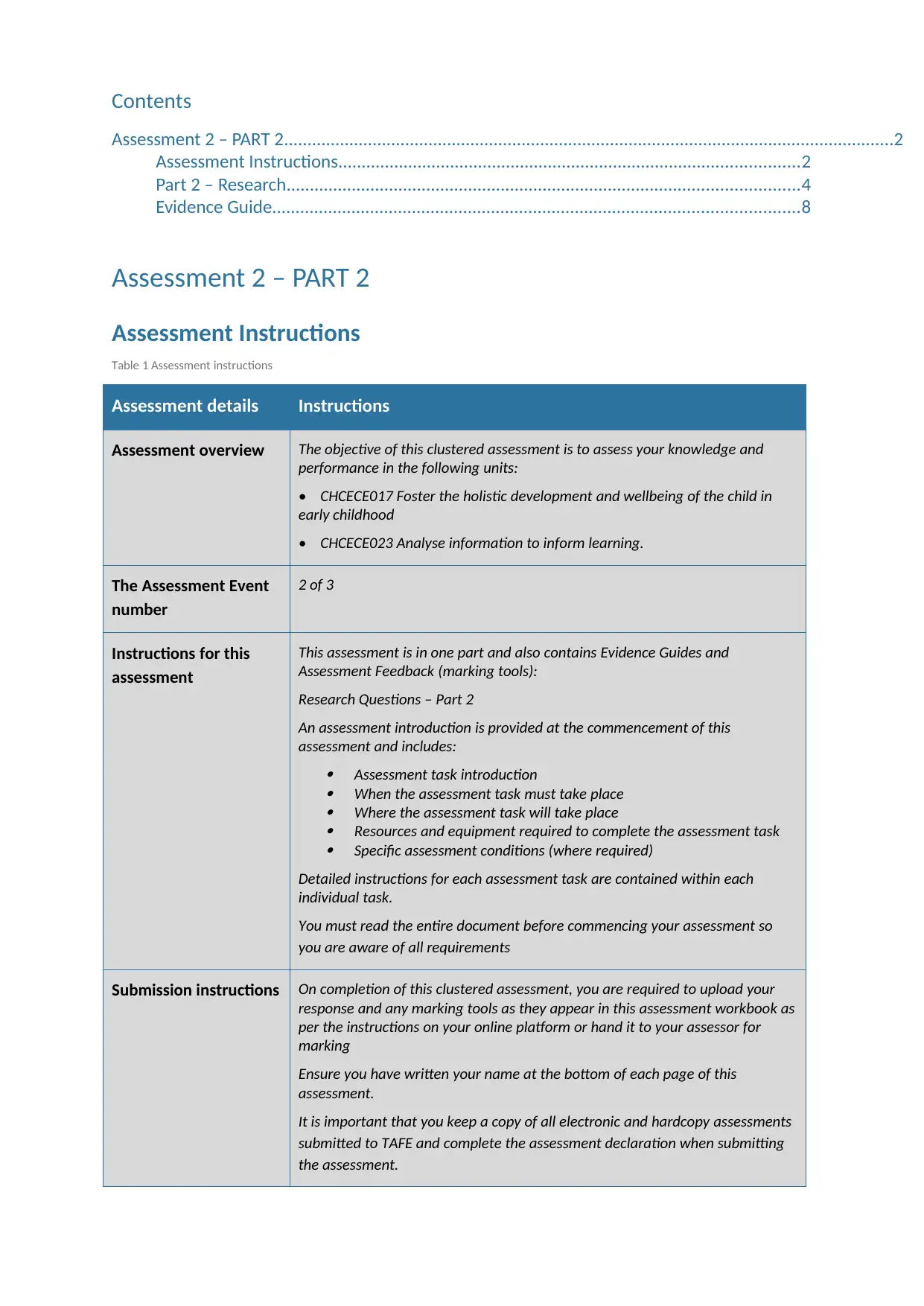
Contents
Assessment 2 – PART 2...................................................................................................................................2
Assessment Instructions...................................................................................................2
Part 2 – Research..............................................................................................................4
Evidence Guide.................................................................................................................8
Assessment 2 – PART 2
Assessment Instructions
Table 1 Assessment instructions
Assessment details Instructions
Assessment overview The objective of this clustered assessment is to assess your knowledge and
performance in the following units:
• CHCECE017 Foster the holistic development and wellbeing of the child in
early childhood
• CHCECE023 Analyse information to inform learning.
The Assessment Event
number
2 of 3
Instructions for this
assessment
This assessment is in one part and also contains Evidence Guides and
Assessment Feedback (marking tools):
Research Questions – Part 2
An assessment introduction is provided at the commencement of this
assessment and includes:
Assessment task introduction
When the assessment task must take place
Where the assessment task will take place
Resources and equipment required to complete the assessment task
Specific assessment conditions (where required)
Detailed instructions for each assessment task are contained within each
individual task.
You must read the entire document before commencing your assessment so
you are aware of all requirements
Submission instructions On completion of this clustered assessment, you are required to upload your
response and any marking tools as they appear in this assessment workbook as
per the instructions on your online platform or hand it to your assessor for
marking
Ensure you have written your name at the bottom of each page of this
assessment.
It is important that you keep a copy of all electronic and hardcopy assessments
submitted to TAFE and complete the assessment declaration when submitting
the assessment.
Assessment 2 – PART 2...................................................................................................................................2
Assessment Instructions...................................................................................................2
Part 2 – Research..............................................................................................................4
Evidence Guide.................................................................................................................8
Assessment 2 – PART 2
Assessment Instructions
Table 1 Assessment instructions
Assessment details Instructions
Assessment overview The objective of this clustered assessment is to assess your knowledge and
performance in the following units:
• CHCECE017 Foster the holistic development and wellbeing of the child in
early childhood
• CHCECE023 Analyse information to inform learning.
The Assessment Event
number
2 of 3
Instructions for this
assessment
This assessment is in one part and also contains Evidence Guides and
Assessment Feedback (marking tools):
Research Questions – Part 2
An assessment introduction is provided at the commencement of this
assessment and includes:
Assessment task introduction
When the assessment task must take place
Where the assessment task will take place
Resources and equipment required to complete the assessment task
Specific assessment conditions (where required)
Detailed instructions for each assessment task are contained within each
individual task.
You must read the entire document before commencing your assessment so
you are aware of all requirements
Submission instructions On completion of this clustered assessment, you are required to upload your
response and any marking tools as they appear in this assessment workbook as
per the instructions on your online platform or hand it to your assessor for
marking
Ensure you have written your name at the bottom of each page of this
assessment.
It is important that you keep a copy of all electronic and hardcopy assessments
submitted to TAFE and complete the assessment declaration when submitting
the assessment.
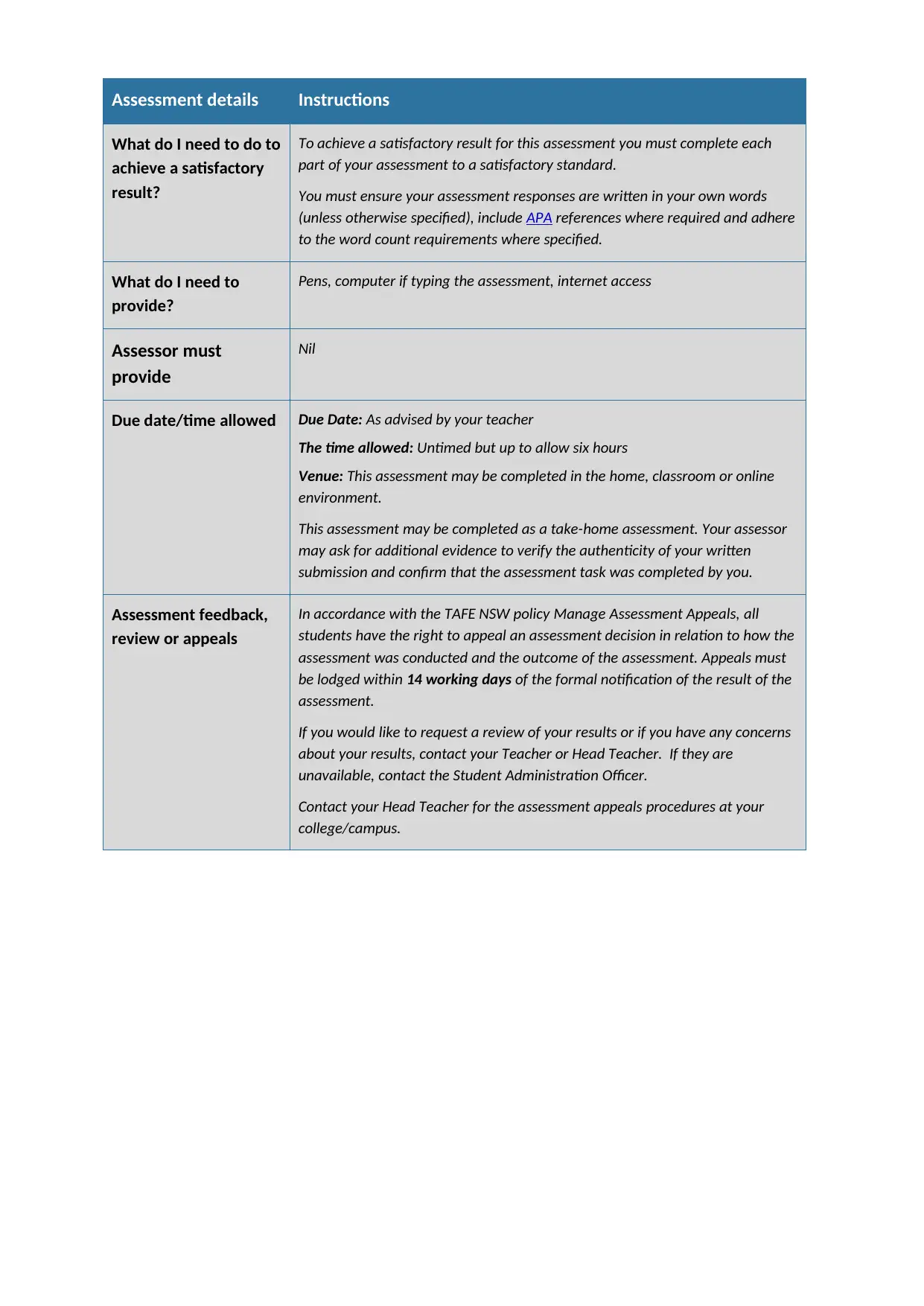
Assessment details Instructions
What do I need to do to
achieve a satisfactory
result?
To achieve a satisfactory result for this assessment you must complete each
part of your assessment to a satisfactory standard.
You must ensure your assessment responses are written in your own words
(unless otherwise specified), include APA references where required and adhere
to the word count requirements where specified.
What do I need to
provide?
Pens, computer if typing the assessment, internet access
Assessor must
provide
Nil
Due date/time allowed Due Date: As advised by your teacher
The time allowed: Untimed but up to allow six hours
Venue: This assessment may be completed in the home, classroom or online
environment.
This assessment may be completed as a take-home assessment. Your assessor
may ask for additional evidence to verify the authenticity of your written
submission and confirm that the assessment task was completed by you.
Assessment feedback,
review or appeals
In accordance with the TAFE NSW policy Manage Assessment Appeals, all
students have the right to appeal an assessment decision in relation to how the
assessment was conducted and the outcome of the assessment. Appeals must
be lodged within 14 working days of the formal notification of the result of the
assessment.
If you would like to request a review of your results or if you have any concerns
about your results, contact your Teacher or Head Teacher. If they are
unavailable, contact the Student Administration Officer.
Contact your Head Teacher for the assessment appeals procedures at your
college/campus.
What do I need to do to
achieve a satisfactory
result?
To achieve a satisfactory result for this assessment you must complete each
part of your assessment to a satisfactory standard.
You must ensure your assessment responses are written in your own words
(unless otherwise specified), include APA references where required and adhere
to the word count requirements where specified.
What do I need to
provide?
Pens, computer if typing the assessment, internet access
Assessor must
provide
Nil
Due date/time allowed Due Date: As advised by your teacher
The time allowed: Untimed but up to allow six hours
Venue: This assessment may be completed in the home, classroom or online
environment.
This assessment may be completed as a take-home assessment. Your assessor
may ask for additional evidence to verify the authenticity of your written
submission and confirm that the assessment task was completed by you.
Assessment feedback,
review or appeals
In accordance with the TAFE NSW policy Manage Assessment Appeals, all
students have the right to appeal an assessment decision in relation to how the
assessment was conducted and the outcome of the assessment. Appeals must
be lodged within 14 working days of the formal notification of the result of the
assessment.
If you would like to request a review of your results or if you have any concerns
about your results, contact your Teacher or Head Teacher. If they are
unavailable, contact the Student Administration Officer.
Contact your Head Teacher for the assessment appeals procedures at your
college/campus.
⊘ This is a preview!⊘
Do you want full access?
Subscribe today to unlock all pages.

Trusted by 1+ million students worldwide
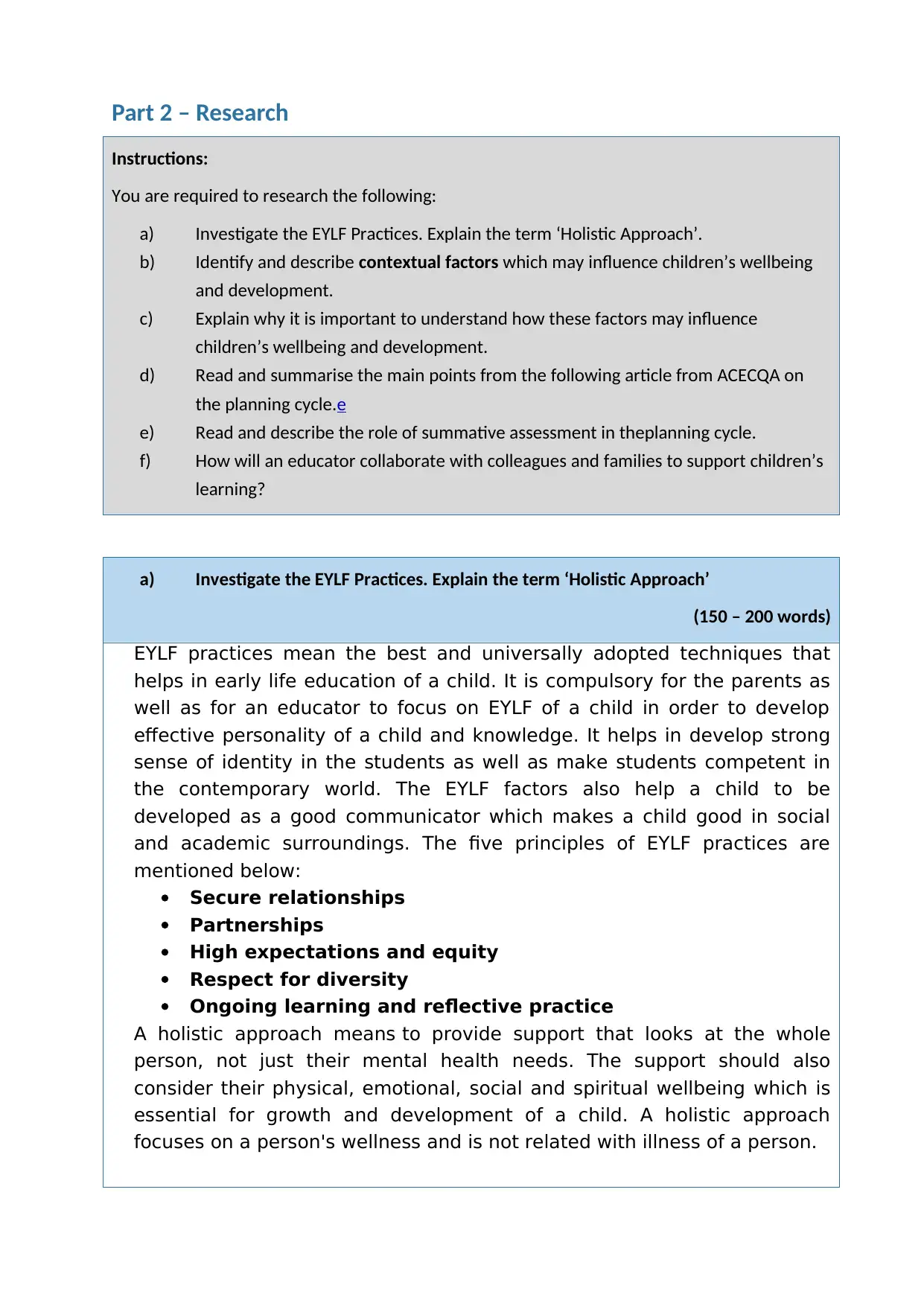
Part 2 – Research
Instructions:
You are required to research the following:
a) Investigate the EYLF Practices. Explain the term ‘Holistic Approach’.
b) Identify and describe contextual factors which may influence children’s wellbeing
and development.
c) Explain why it is important to understand how these factors may influence
children’s wellbeing and development.
d) Read and summarise the main points from the following article from ACECQA on
the planning cycle.e
e) Read and describe the role of summative assessment in theplanning cycle.
f) How will an educator collaborate with colleagues and families to support children’s
learning?
a) Investigate the EYLF Practices. Explain the term ‘Holistic Approach’
(150 – 200 words)
EYLF practices mean the best and universally adopted techniques that
helps in early life education of a child. It is compulsory for the parents as
well as for an educator to focus on EYLF of a child in order to develop
effective personality of a child and knowledge. It helps in develop strong
sense of identity in the students as well as make students competent in
the contemporary world. The EYLF factors also help a child to be
developed as a good communicator which makes a child good in social
and academic surroundings. The five principles of EYLF practices are
mentioned below:
Secure relationships
Partnerships
High expectations and equity
Respect for diversity
Ongoing learning and reflective practice
A holistic approach means to provide support that looks at the whole
person, not just their mental health needs. The support should also
consider their physical, emotional, social and spiritual wellbeing which is
essential for growth and development of a child. A holistic approach
focuses on a person's wellness and is not related with illness of a person.
Instructions:
You are required to research the following:
a) Investigate the EYLF Practices. Explain the term ‘Holistic Approach’.
b) Identify and describe contextual factors which may influence children’s wellbeing
and development.
c) Explain why it is important to understand how these factors may influence
children’s wellbeing and development.
d) Read and summarise the main points from the following article from ACECQA on
the planning cycle.e
e) Read and describe the role of summative assessment in theplanning cycle.
f) How will an educator collaborate with colleagues and families to support children’s
learning?
a) Investigate the EYLF Practices. Explain the term ‘Holistic Approach’
(150 – 200 words)
EYLF practices mean the best and universally adopted techniques that
helps in early life education of a child. It is compulsory for the parents as
well as for an educator to focus on EYLF of a child in order to develop
effective personality of a child and knowledge. It helps in develop strong
sense of identity in the students as well as make students competent in
the contemporary world. The EYLF factors also help a child to be
developed as a good communicator which makes a child good in social
and academic surroundings. The five principles of EYLF practices are
mentioned below:
Secure relationships
Partnerships
High expectations and equity
Respect for diversity
Ongoing learning and reflective practice
A holistic approach means to provide support that looks at the whole
person, not just their mental health needs. The support should also
consider their physical, emotional, social and spiritual wellbeing which is
essential for growth and development of a child. A holistic approach
focuses on a person's wellness and is not related with illness of a person.
Paraphrase This Document
Need a fresh take? Get an instant paraphrase of this document with our AI Paraphraser

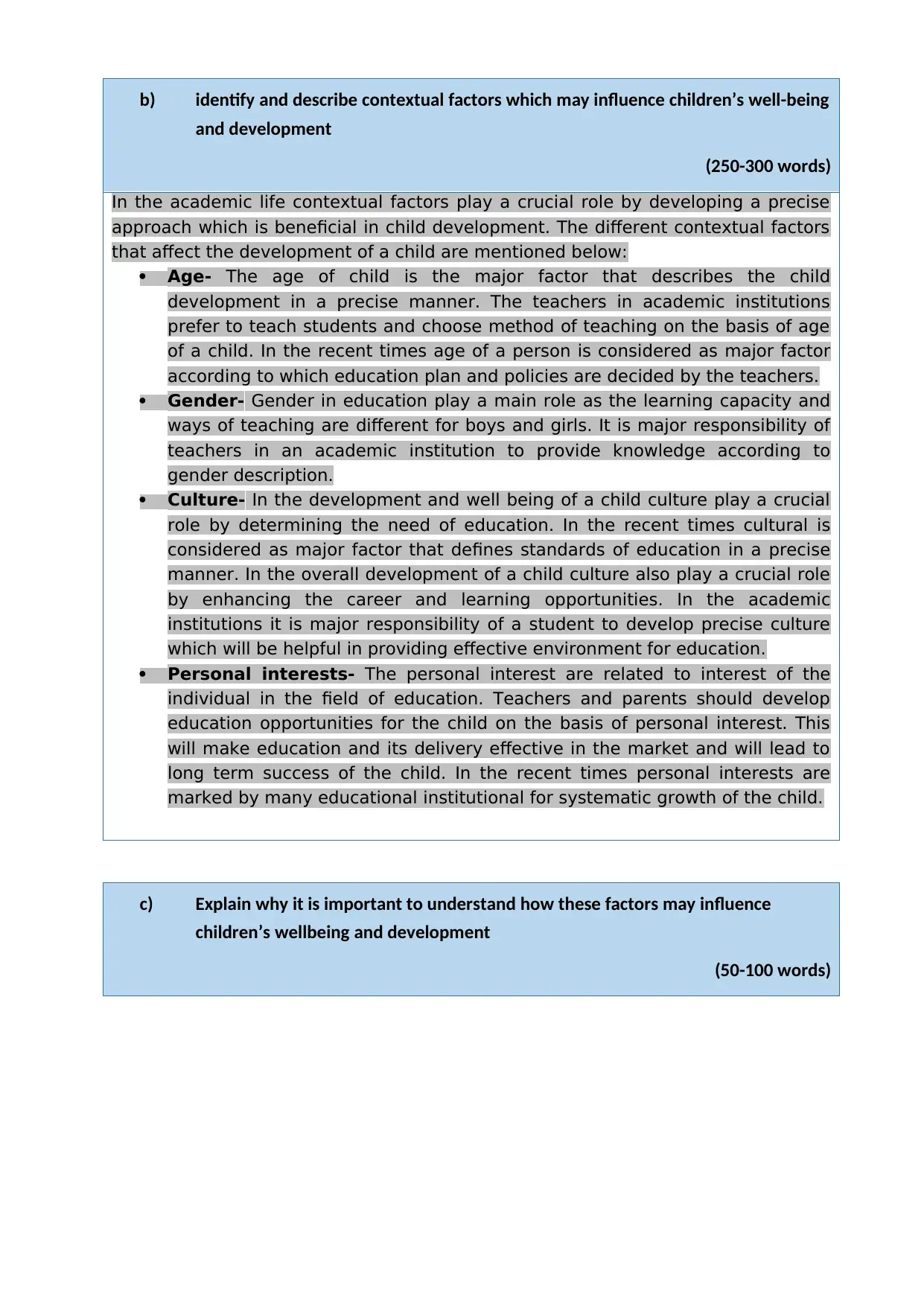
b) identify and describe contextual factors which may influence children’s well-being
and development
(250-300 words)
In the academic life contextual factors play a crucial role by developing a precise
approach which is beneficial in child development. The different contextual factors
that affect the development of a child are mentioned below:
Age- The age of child is the major factor that describes the child
development in a precise manner. The teachers in academic institutions
prefer to teach students and choose method of teaching on the basis of age
of a child. In the recent times age of a person is considered as major factor
according to which education plan and policies are decided by the teachers.
Gender- Gender in education play a main role as the learning capacity and
ways of teaching are different for boys and girls. It is major responsibility of
teachers in an academic institution to provide knowledge according to
gender description.
Culture- In the development and well being of a child culture play a crucial
role by determining the need of education. In the recent times cultural is
considered as major factor that defines standards of education in a precise
manner. In the overall development of a child culture also play a crucial role
by enhancing the career and learning opportunities. In the academic
institutions it is major responsibility of a student to develop precise culture
which will be helpful in providing effective environment for education.
Personal interests- The personal interest are related to interest of the
individual in the field of education. Teachers and parents should develop
education opportunities for the child on the basis of personal interest. This
will make education and its delivery effective in the market and will lead to
long term success of the child. In the recent times personal interests are
marked by many educational institutional for systematic growth of the child.
c) Explain why it is important to understand how these factors may influence
children’s wellbeing and development
(50-100 words)
and development
(250-300 words)
In the academic life contextual factors play a crucial role by developing a precise
approach which is beneficial in child development. The different contextual factors
that affect the development of a child are mentioned below:
Age- The age of child is the major factor that describes the child
development in a precise manner. The teachers in academic institutions
prefer to teach students and choose method of teaching on the basis of age
of a child. In the recent times age of a person is considered as major factor
according to which education plan and policies are decided by the teachers.
Gender- Gender in education play a main role as the learning capacity and
ways of teaching are different for boys and girls. It is major responsibility of
teachers in an academic institution to provide knowledge according to
gender description.
Culture- In the development and well being of a child culture play a crucial
role by determining the need of education. In the recent times cultural is
considered as major factor that defines standards of education in a precise
manner. In the overall development of a child culture also play a crucial role
by enhancing the career and learning opportunities. In the academic
institutions it is major responsibility of a student to develop precise culture
which will be helpful in providing effective environment for education.
Personal interests- The personal interest are related to interest of the
individual in the field of education. Teachers and parents should develop
education opportunities for the child on the basis of personal interest. This
will make education and its delivery effective in the market and will lead to
long term success of the child. In the recent times personal interests are
marked by many educational institutional for systematic growth of the child.
c) Explain why it is important to understand how these factors may influence
children’s wellbeing and development
(50-100 words)
⊘ This is a preview!⊘
Do you want full access?
Subscribe today to unlock all pages.

Trusted by 1+ million students worldwide
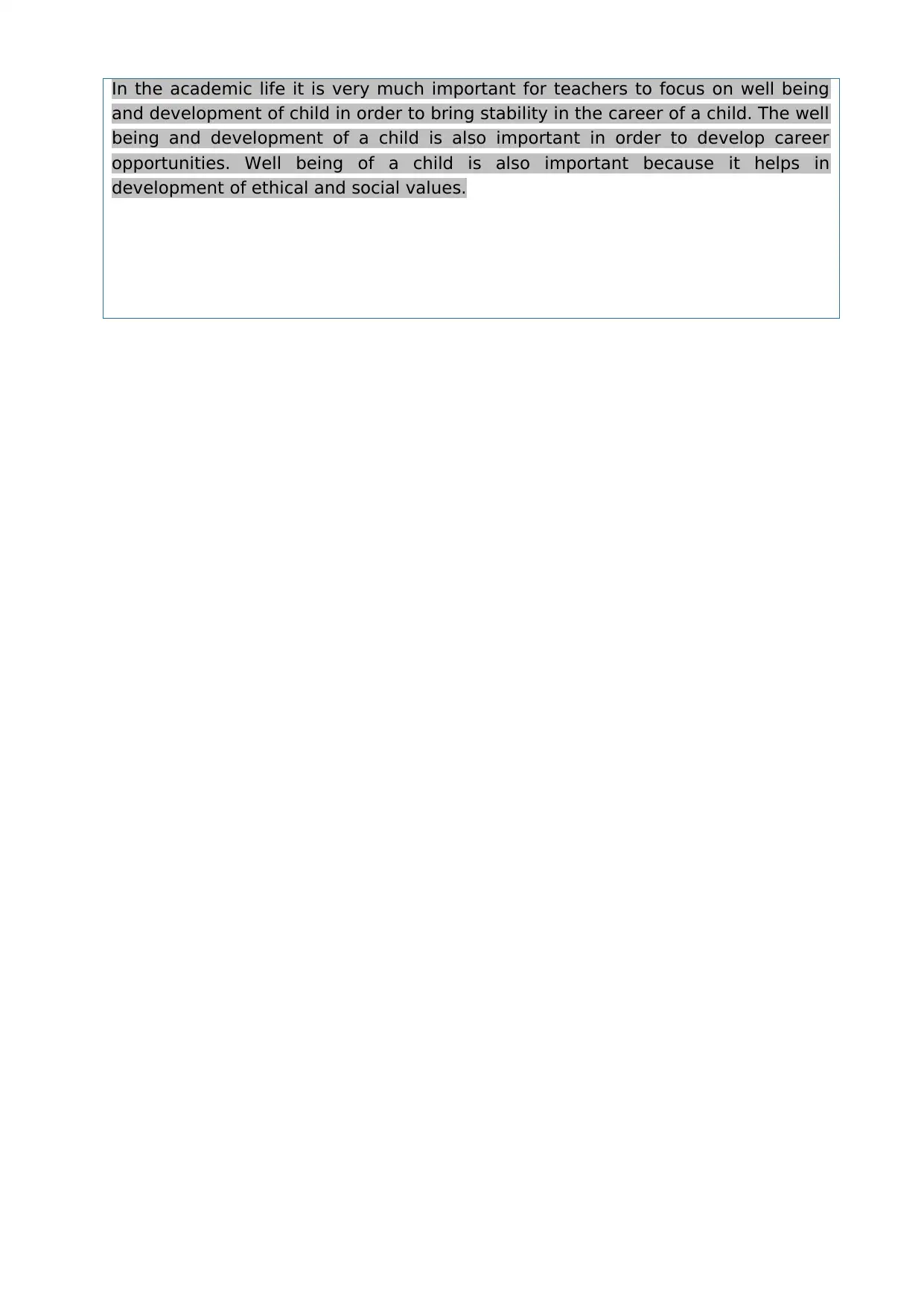
In the academic life it is very much important for teachers to focus on well being
and development of child in order to bring stability in the career of a child. The well
being and development of a child is also important in order to develop career
opportunities. Well being of a child is also important because it helps in
development of ethical and social values.
and development of child in order to bring stability in the career of a child. The well
being and development of a child is also important in order to develop career
opportunities. Well being of a child is also important because it helps in
development of ethical and social values.
Paraphrase This Document
Need a fresh take? Get an instant paraphrase of this document with our AI Paraphraser
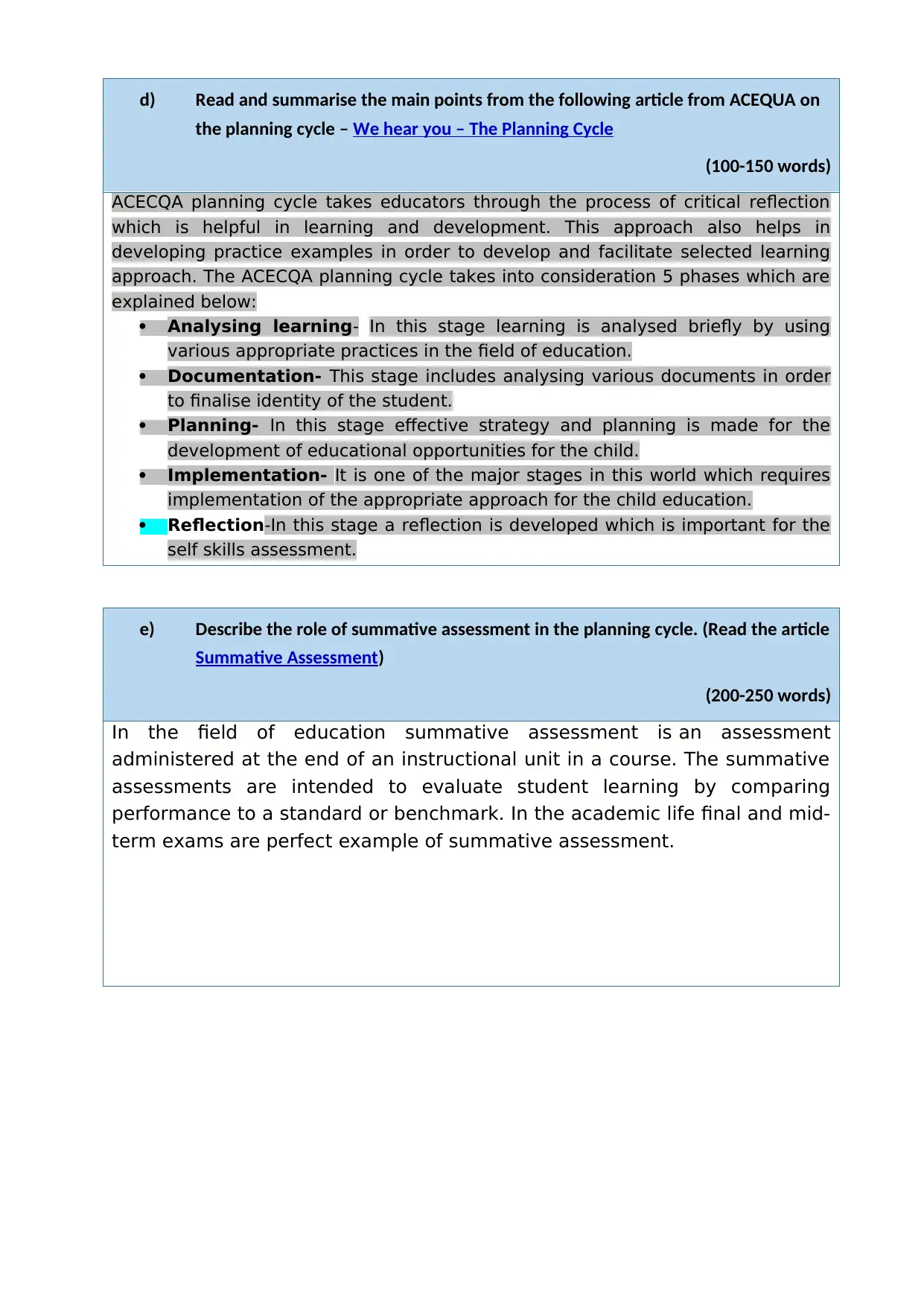
d) Read and summarise the main points from the following article from ACEQUA on
the planning cycle – We hear you – The Planning Cycle
(100-150 words)
ACECQA planning cycle takes educators through the process of critical reflection
which is helpful in learning and development. This approach also helps in
developing practice examples in order to develop and facilitate selected learning
approach. The ACECQA planning cycle takes into consideration 5 phases which are
explained below:
Analysing learning- In this stage learning is analysed briefly by using
various appropriate practices in the field of education.
Documentation- This stage includes analysing various documents in order
to finalise identity of the student.
Planning- In this stage effective strategy and planning is made for the
development of educational opportunities for the child.
Implementation- It is one of the major stages in this world which requires
implementation of the appropriate approach for the child education.
Reflection-In this stage a reflection is developed which is important for the
self skills assessment.
e) Describe the role of summative assessment in the planning cycle. (Read the article
Summative Assessment)
(200-250 words)
In the field of education summative assessment is an assessment
administered at the end of an instructional unit in a course. The summative
assessments are intended to evaluate student learning by comparing
performance to a standard or benchmark. In the academic life final and mid-
term exams are perfect example of summative assessment.
the planning cycle – We hear you – The Planning Cycle
(100-150 words)
ACECQA planning cycle takes educators through the process of critical reflection
which is helpful in learning and development. This approach also helps in
developing practice examples in order to develop and facilitate selected learning
approach. The ACECQA planning cycle takes into consideration 5 phases which are
explained below:
Analysing learning- In this stage learning is analysed briefly by using
various appropriate practices in the field of education.
Documentation- This stage includes analysing various documents in order
to finalise identity of the student.
Planning- In this stage effective strategy and planning is made for the
development of educational opportunities for the child.
Implementation- It is one of the major stages in this world which requires
implementation of the appropriate approach for the child education.
Reflection-In this stage a reflection is developed which is important for the
self skills assessment.
e) Describe the role of summative assessment in the planning cycle. (Read the article
Summative Assessment)
(200-250 words)
In the field of education summative assessment is an assessment
administered at the end of an instructional unit in a course. The summative
assessments are intended to evaluate student learning by comparing
performance to a standard or benchmark. In the academic life final and mid-
term exams are perfect example of summative assessment.
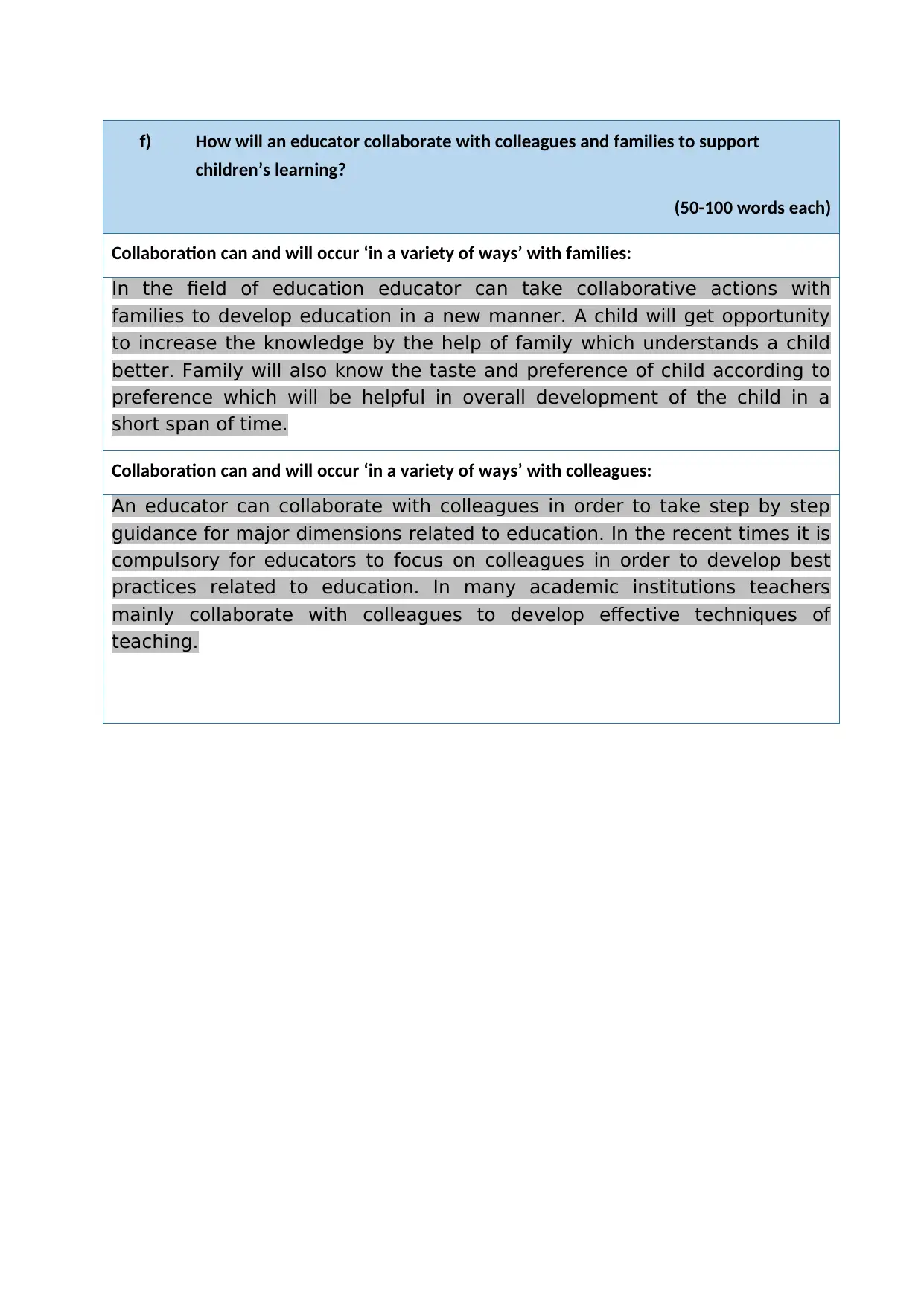
f) How will an educator collaborate with colleagues and families to support
children’s learning?
(50-100 words each)
Collaboration can and will occur ‘in a variety of ways’ with families:
In the field of education educator can take collaborative actions with
families to develop education in a new manner. A child will get opportunity
to increase the knowledge by the help of family which understands a child
better. Family will also know the taste and preference of child according to
preference which will be helpful in overall development of the child in a
short span of time.
Collaboration can and will occur ‘in a variety of ways’ with colleagues:
An educator can collaborate with colleagues in order to take step by step
guidance for major dimensions related to education. In the recent times it is
compulsory for educators to focus on colleagues in order to develop best
practices related to education. In many academic institutions teachers
mainly collaborate with colleagues to develop effective techniques of
teaching.
children’s learning?
(50-100 words each)
Collaboration can and will occur ‘in a variety of ways’ with families:
In the field of education educator can take collaborative actions with
families to develop education in a new manner. A child will get opportunity
to increase the knowledge by the help of family which understands a child
better. Family will also know the taste and preference of child according to
preference which will be helpful in overall development of the child in a
short span of time.
Collaboration can and will occur ‘in a variety of ways’ with colleagues:
An educator can collaborate with colleagues in order to take step by step
guidance for major dimensions related to education. In the recent times it is
compulsory for educators to focus on colleagues in order to develop best
practices related to education. In many academic institutions teachers
mainly collaborate with colleagues to develop effective techniques of
teaching.
⊘ This is a preview!⊘
Do you want full access?
Subscribe today to unlock all pages.

Trusted by 1+ million students worldwide
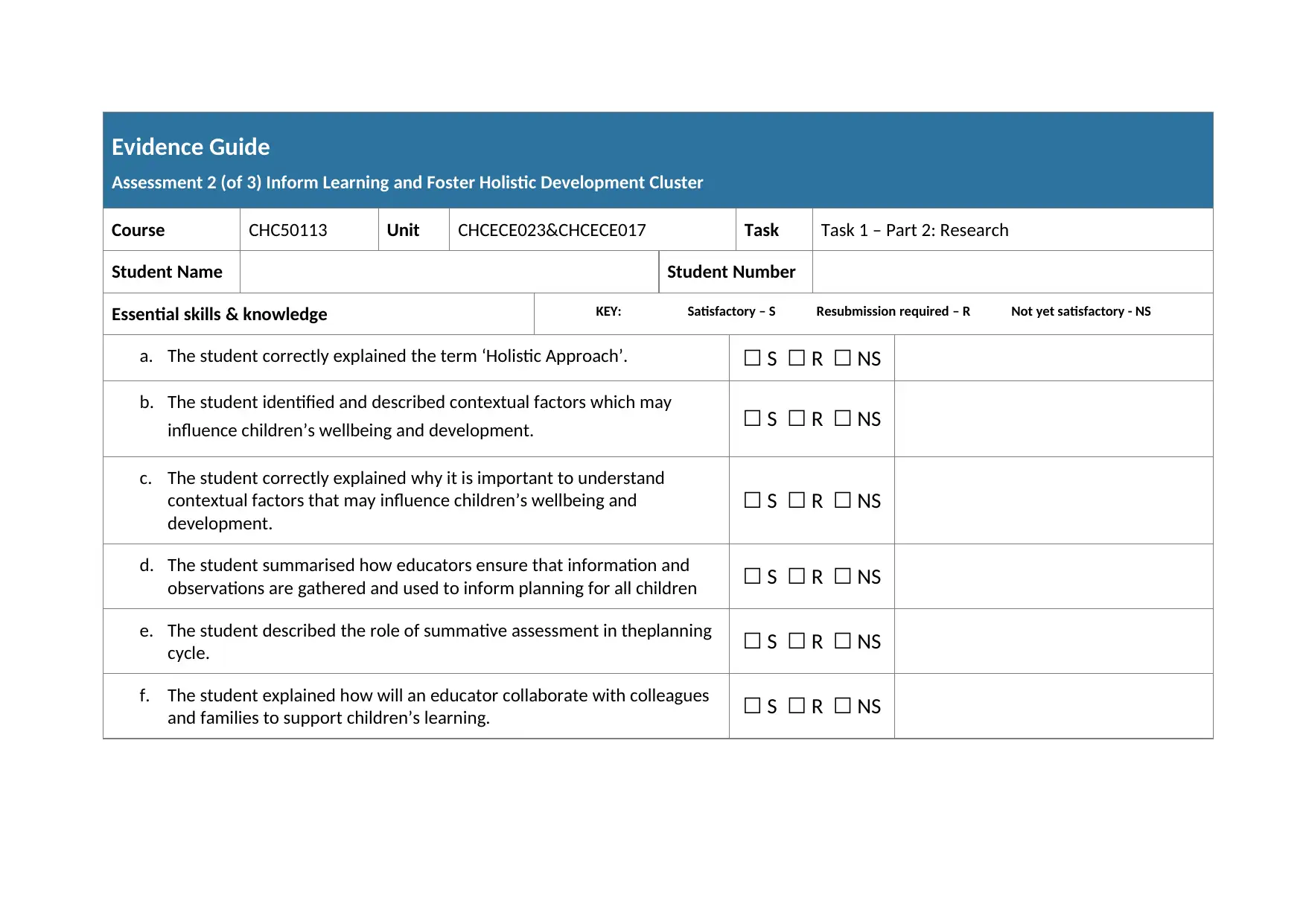
Evidence Guide
Assessment 2 (of 3) Inform Learning and Foster Holistic Development Cluster
Course CHC50113 Unit CHCECE023&CHCECE017 Task Task 1 – Part 2: Research
Student Name Student Number
Essential skills & knowledge KEY: Satisfactory – S Resubmission required – R Not yet satisfactory - NS
a. The student correctly explained the term ‘Holistic Approach’. ☐ S ☐ R ☐ NS
b. The student identified and described contextual factors which may
influence children’s wellbeing and development. ☐ S ☐ R ☐ NS
c. The student correctly explained why it is important to understand
contextual factors that may influence children’s wellbeing and
development.
☐ S ☐ R ☐ NS
d. The student summarised how educators ensure that information and
observations are gathered and used to inform planning for all children ☐ S ☐ R ☐ NS
e. The student described the role of summative assessment in theplanning
cycle. ☐ S ☐ R ☐ NS
f. The student explained how will an educator collaborate with colleagues
and families to support children’s learning. ☐ S ☐ R ☐ NS
Assessment 2 (of 3) Inform Learning and Foster Holistic Development Cluster
Course CHC50113 Unit CHCECE023&CHCECE017 Task Task 1 – Part 2: Research
Student Name Student Number
Essential skills & knowledge KEY: Satisfactory – S Resubmission required – R Not yet satisfactory - NS
a. The student correctly explained the term ‘Holistic Approach’. ☐ S ☐ R ☐ NS
b. The student identified and described contextual factors which may
influence children’s wellbeing and development. ☐ S ☐ R ☐ NS
c. The student correctly explained why it is important to understand
contextual factors that may influence children’s wellbeing and
development.
☐ S ☐ R ☐ NS
d. The student summarised how educators ensure that information and
observations are gathered and used to inform planning for all children ☐ S ☐ R ☐ NS
e. The student described the role of summative assessment in theplanning
cycle. ☐ S ☐ R ☐ NS
f. The student explained how will an educator collaborate with colleagues
and families to support children’s learning. ☐ S ☐ R ☐ NS
Paraphrase This Document
Need a fresh take? Get an instant paraphrase of this document with our AI Paraphraser
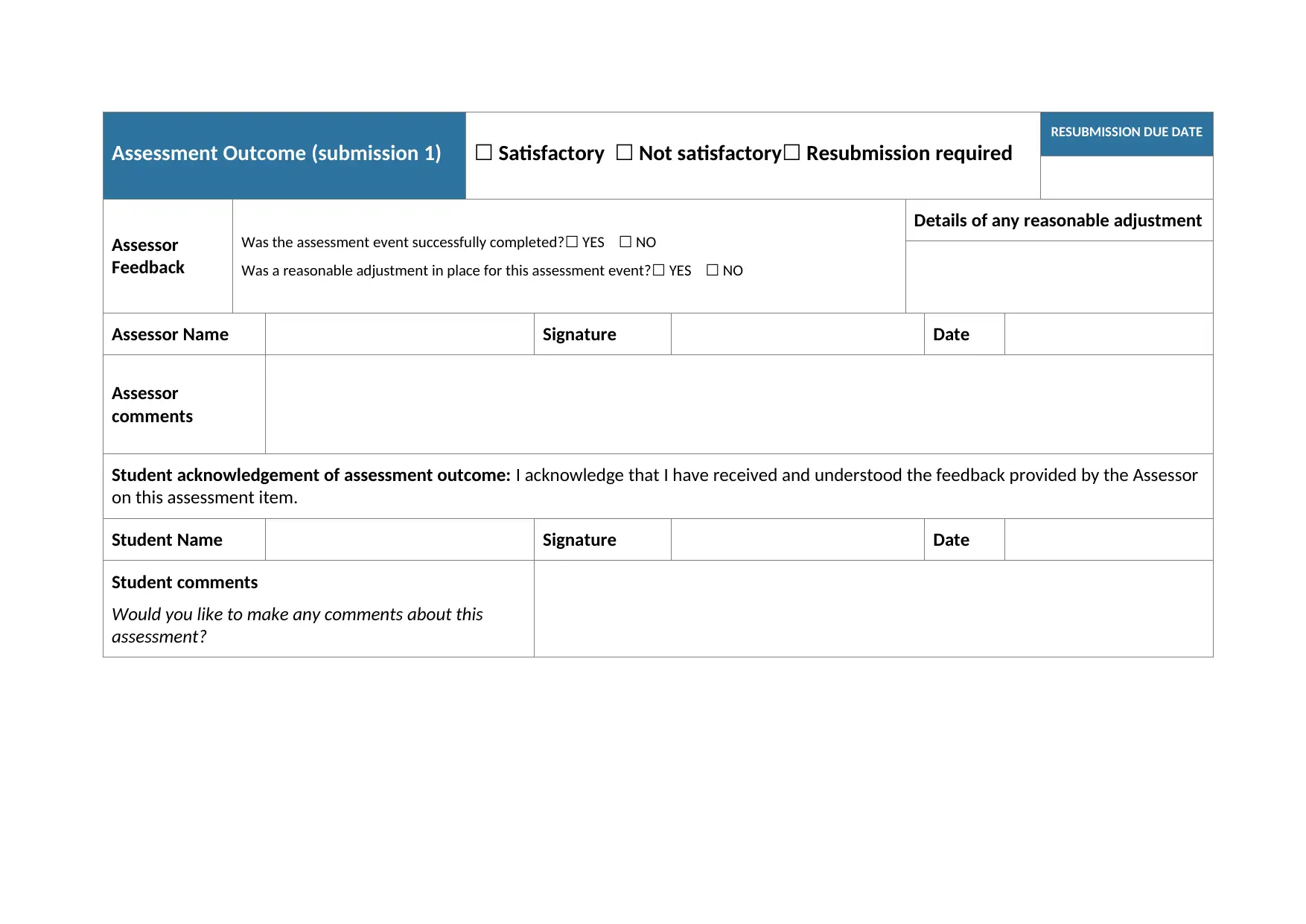
Assessment Outcome (submission 1) ☐ Satisfactory ☐ Not satisfactory☐ Resubmission required
RESUBMISSION DUE DATE
Assessor
Feedback
Was the assessment event successfully completed?☐ YES ☐ NO
Was a reasonable adjustment in place for this assessment event?☐ YES ☐ NO
Details of any reasonable adjustment
Assessor Name Signature Date
Assessor
comments
Student acknowledgement of assessment outcome: I acknowledge that I have received and understood the feedback provided by the Assessor
on this assessment item.
Student Name Signature Date
Student comments
Would you like to make any comments about this
assessment?
RESUBMISSION DUE DATE
Assessor
Feedback
Was the assessment event successfully completed?☐ YES ☐ NO
Was a reasonable adjustment in place for this assessment event?☐ YES ☐ NO
Details of any reasonable adjustment
Assessor Name Signature Date
Assessor
comments
Student acknowledgement of assessment outcome: I acknowledge that I have received and understood the feedback provided by the Assessor
on this assessment item.
Student Name Signature Date
Student comments
Would you like to make any comments about this
assessment?
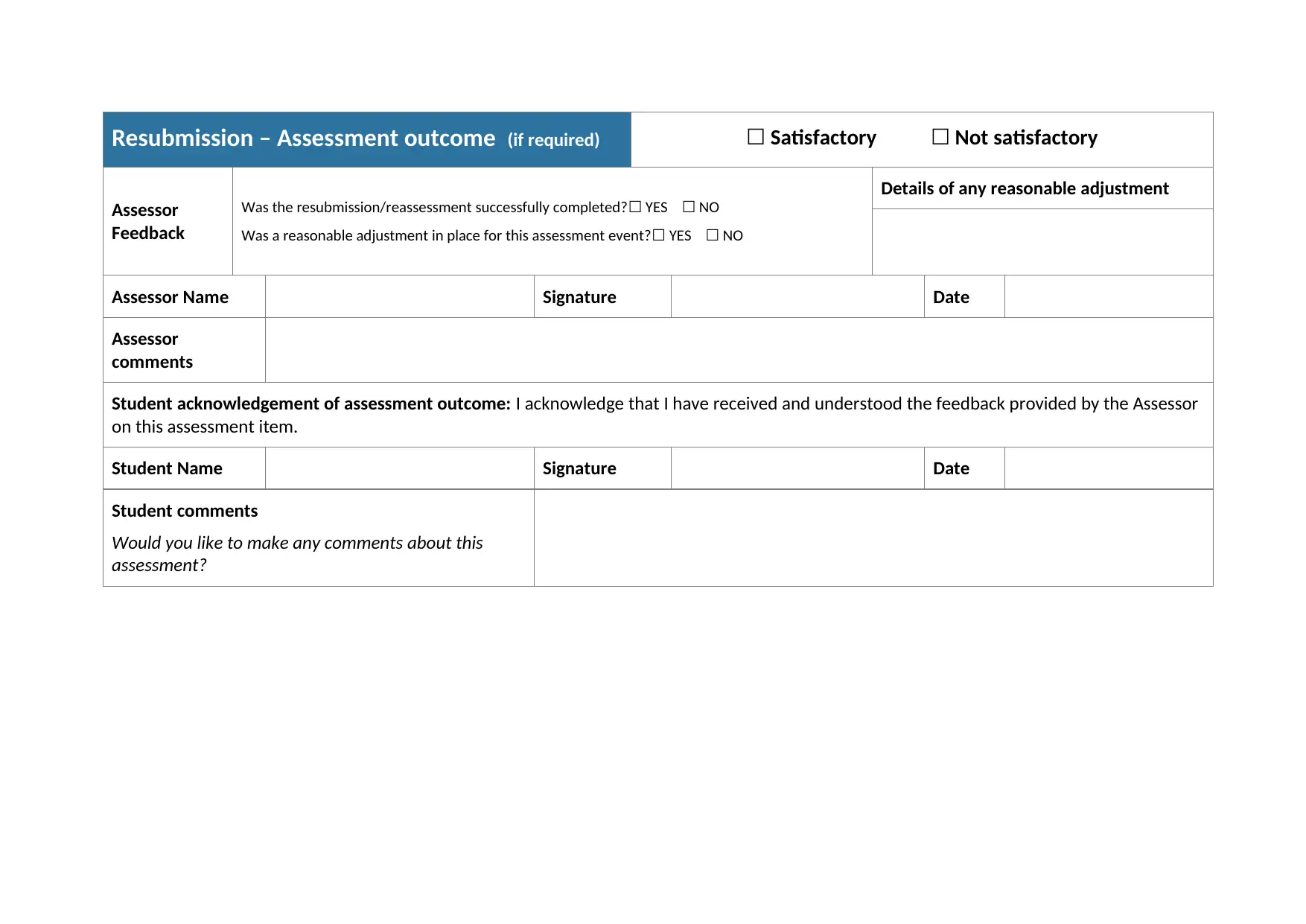
Resubmission – Assessment outcome (if required) ☐ Satisfactory ☐ Not satisfactory
Assessor
Feedback
Was the resubmission/reassessment successfully completed?☐ YES ☐ NO
Was a reasonable adjustment in place for this assessment event?☐ YES ☐ NO
Details of any reasonable adjustment
Assessor Name Signature Date
Assessor
comments
Student acknowledgement of assessment outcome: I acknowledge that I have received and understood the feedback provided by the Assessor
on this assessment item.
Student Name Signature Date
Student comments
Would you like to make any comments about this
assessment?
Assessor
Feedback
Was the resubmission/reassessment successfully completed?☐ YES ☐ NO
Was a reasonable adjustment in place for this assessment event?☐ YES ☐ NO
Details of any reasonable adjustment
Assessor Name Signature Date
Assessor
comments
Student acknowledgement of assessment outcome: I acknowledge that I have received and understood the feedback provided by the Assessor
on this assessment item.
Student Name Signature Date
Student comments
Would you like to make any comments about this
assessment?
⊘ This is a preview!⊘
Do you want full access?
Subscribe today to unlock all pages.

Trusted by 1+ million students worldwide
1 out of 13
Related Documents
Your All-in-One AI-Powered Toolkit for Academic Success.
+13062052269
info@desklib.com
Available 24*7 on WhatsApp / Email
![[object Object]](/_next/static/media/star-bottom.7253800d.svg)
Unlock your academic potential
Copyright © 2020–2026 A2Z Services. All Rights Reserved. Developed and managed by ZUCOL.




